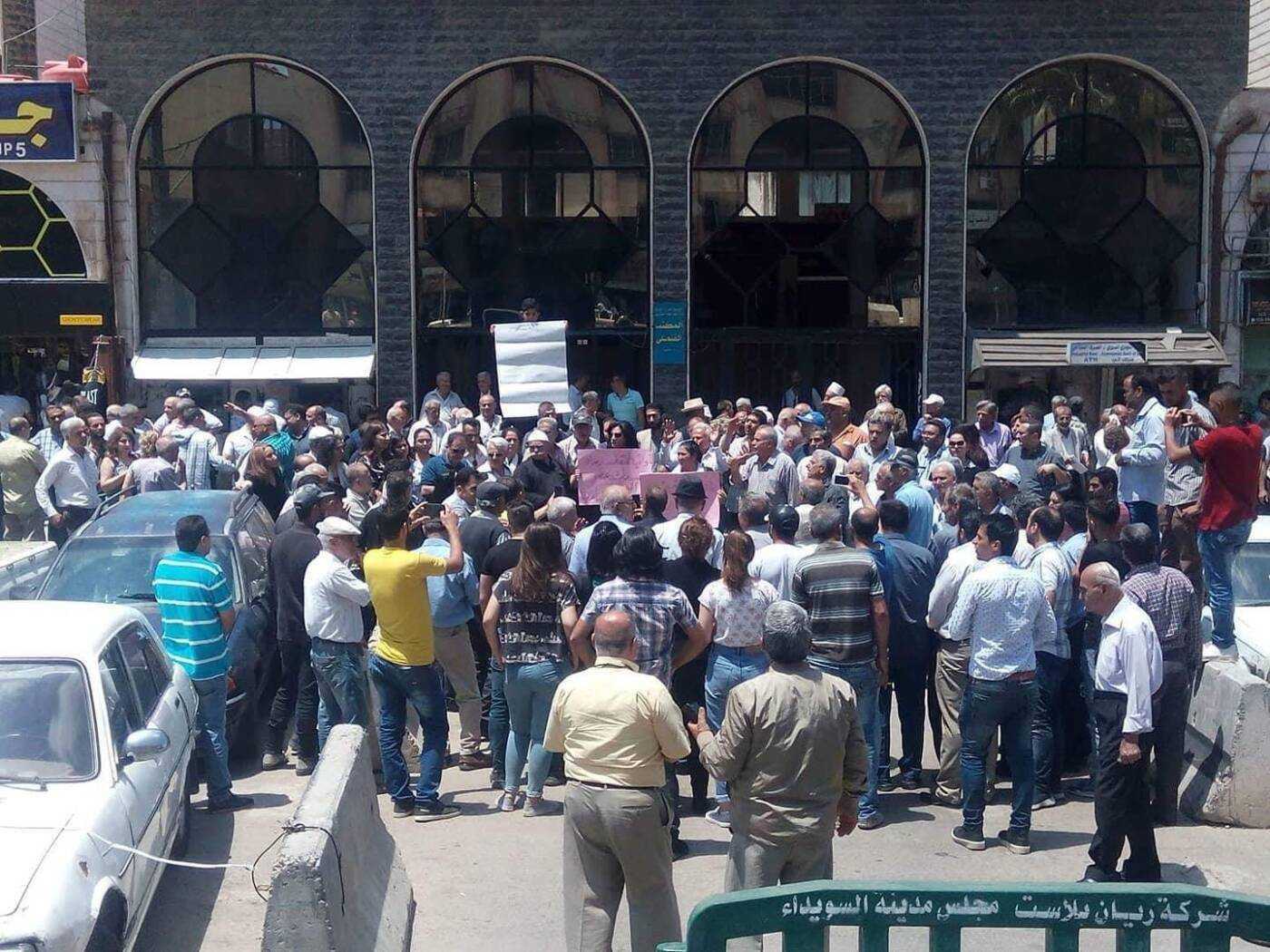One week since deadly attack, latest evacuations of Islamic State fighters leave Suwayda residents ‘paralyzed by fear’
Residents chant anti-Islamic State slogans in Suwayda city on Wednesday. […]
1 August 2018

AMMAN: Syrian government buses evacuated hundreds of Islamic State militants formerly entrenched in the country’s southwest towards a remote section of the Syrian desert Tuesday night, as part of an agreement meant to secure the release of dozens of civilians kidnapped by the hardline Islamist group last week.
An undisclosed number of fighters from Jaish Khaled bin al-Walid (JKW), a hardline faction loyal to the Islamic State (IS), reportedly evacuated their positions near the Syrian-Jordanian border on Tuesday, boarding government buses bound for the Syrian Badia—a sparsely populated expanse of desert stretching across much of central and southern Syria.
In exchange for Tuesday’s evacuations, IS fighters are expected to release at least 22 prisoners captured from at least one village in Suwayda province last week during a devastating 12-hour raid near the outskirts of the Badia, several Syrian news outlets reported.
Newly arrived JKW fighters from southwestern Syria’s Yarmouk Basin—estimated to number in the hundreds—join other IS militants previously relocated to the desert region from locations across Syria following a series of pro-government offensives and evacuation deals.
The Syrian army drove IS militants out of central Hama province’s desert Uqayrbat region in September 2017, and a government evacuation deal cleared a former IS stronghold in the Yarmouk Palestinian refugee camp and neighbouring Hajar al-Aswad in south Damascus earlier this year. Following the latest evacuations, the Syrian Badia is now host to hundreds of evacuated jihadists now within striking distance of some of southern Syria’s major population centers.
Last week, IS killed at least 250 civilians in a devastating and meticulously planned attack on mostly government-held, Druze-majority Suwayda province. Local Druze fighters eventually drove back IS militants after hours of fighting, although not before the hardline Islamist group captured more than two dozen local women and children, and withdrew into the desert.
Syrian state news agencies reported that Syrian army units led the counterattack against IS forces, though local militia commanders and activists dispute this claim—insisting that Suwayda’s local fighters battled IS alone.
“The Syrian government didn’t arrive [to the site of the IS attack] until 36 hours later,” Miqdad, a spokesman for the Men of Dignity who withheld his full name, told Syria Direct on Monday.
The Men of Dignity is among the largest armed groups in the province.
Without the support of the Syrian army, Miqdad added, thousands of fighters from Suwayda—some unaffiliated with either pro-government or local, homegrown militias—rushed to the aid of villages under IS attack. Within hours, the Islamist militants had retreated back into the desert.
The IS attack—and the Syrian government’s handling of it—inflamed already strained tensions between Damascus and local authorities in Suwayda. Historically, authorities in Suwayda have acted with relative autonomy—local militias control major swathes of the province and men there tend to complete their mandatory military service without ever leaving its borders. But as the Syrian government takes control over more and more of the country, Damascus appears to be attempting to reassert itself in the country’s semi-autonomous areas.
Local activists and media outlets in Suwayda reported that the IS attack came just after a Russian delegation visited the province, requesting that 50,000 local men turn themselves over for military service. When local leaders refused, the Syrian government allegedly withdrew large numbers of their forces from the province—paving the way for the IS attack, sources on the ground told Syria Direct.
Syria Direct could not independently verify the claims. A Syrian military source did not respond to request for comment by the time of publication.
Anger over the Syrian government’s handling of the brutal IS assault means tensions are running high in Suwayda.
“What happened in Suwayda is more than just a Daesh attack,” Suwayda-based journalist Noura al-Basha told Syria Direct earlier this week, using the Arabic acronym for IS. “People are afraid that another attack may happen.”
“IS moves around in plain sight of the regime,” al-Basha added. “It makes us think that they opened the door for this attack to happen.”
On Friday, residents of the town of a-Shabaqi a-Sharqi expelled several Syrian government officials from a funeral ceremony mourning those killed in the attack, pro-opposition media outlets reported.
Although fighting within Suwayda’s towns and villages has halted for the time being, “fear still paralyzes” the province, according to local resident Mazen al-Hasan.
“Daesh certainly remains a threat,” al-Hasan told Syria Direct.
A number of Syrian and international analysts have warned that despite losing almost all of its territory, IS is retreating into the desert to reinvent its tactics—preparing for a resurgence with guerrilla-style attacks.
At its height in 2014, IS controlled a vast swathe of territory reaching across Syria and Iraq that was larger than Great Britain. However, separate campaigns against the hardline Islamist group by the Syrian government and a US-led international coalition ultimately reduced its territory by more than 98 percent.
Now, IS has essentially gone full circle: fleeing back into the Syrian and Iraqi deserts and focusing on quick, deadly hit-and-run attacks and assassinations.
Although the Islamist group’s assault on Suwayda is its most deadly attack in recent memory, local media outlets have reported a string of assassinations against Kurdish and Syrian government officials in areas formerly under IS control in recent months.
This report is part of Syria’s month-long coverage of former Islamic State-held territories in partnership with the Konrad Adenauer Foundation and reporters on the ground in Syria. Read our primer here.








